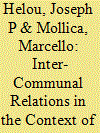| Srl | Item |
| 1 |
ID:
073321


|
|
|
|
|
| Publication |
2006.
|
| Summary/Abstract |
A significant portion of the current debate on secularism has focused on Nehru's role in conceptualizing and institutionalizing this concept. Supporters of the Nehruvian legacy of secularism applaud him for adopting this policy and for establishing communal harmony. Critics hold Nehru responsible for the problems associated with secularism. This article assesses the significance and consequences of Pandit Nehru's contributions to secularism by carefully examining the track record of his government in this area. My main argument is that Nehru deserves credit for introducing secularism to a people who were inured to discriminatory, anti-minority views and practices for centuries. However, he failed to institutionalize this policy in the polity and civil society. I posit that though Pandit Nehru faced formidable opposition to his secular policies from Hindu conservatives within the Congress and the Hindu nationalists outside, he could have pursued several, long-term, non-confrontational strategies for institutionalizing secularism. His failure to do so blemished what would otherwise have been an abiding contribution to Indian multiculturalism.
|
|
|
|
|
|
|
|
|
|
|
|
|
|
|
|
| 2 |
ID:
190239


|
|
|
|
|
| Summary/Abstract |
This paper explores why the production of communal fear via demographic and political-economic factors can explain group behavior (here the Maronites of Lebanon) in diverse ethnic, religious and sectarian plural societies rather than a strict reliance on structural and instrumental explanations. It argues that communal fear, deeply entrenched in political, socioeconomic and anthropological interpretations of groups’ fertility rates, migration patterns, land ownership and shares of industry and agriculture inter alia, can explain Maronites’ everyday practices of preferring land purchases in certain (ethno-religiously defined-) areas, occupying specific jobs and dominating certain economic sectors. While we acknowledge the role of individual cognition—Lebanese citizens’ ability—in breaking away from the clutches of group thinking, we find that many pervasive political, economic and social factors reaffirm group solidarity in plural societies; thus rendering useful the concept of communal fear in explaining how members of groups adopt everyday practices to hedge against perceived risks.
|
|
|
|
|
|
|
|
|
|
|
|
|
|
|
|